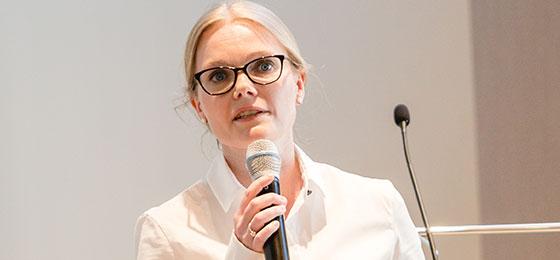"There's a lot of room for improving hand hygiene"

The coronavirus pandemic could have positive side effects, as people protect themselves better against infections. Interview with Sarah Tschudin Sutter.
The measures we take to protect ourselves against COVID-19 also reduce the risk of infection with other germs. Could these behavioural changes also curb the spread of antibiotic-resistant bacteria? Sarah Tschudin Sutter, head of the hospital hygiene department at Basel University Hospital, talks about potential positive consequences of the coronavirus pandemic.
Handwashing, sneezing into the crook of your arm, staying home if you have a fever or cough, wearing a mask, not shaking hands: can personal protective measures, which we are by now all familiar with thanks to the FOPH's Corona campaign, also prevent the transmission of antibiotic-resistant germs?
These rules of behaviour reduce the risk of catching or transmitting bacteria or a virus quite generally. This includes antibiotic-resistant bacteria.
In that case, could the corona pandemic have the positive side-effect of reducing the spread of antibiotic-resistant bacteria?
It's true that many people around the world have been protecting themselves against infectious diseases in a way that used to be pretty much limited to hospitals. Whether this has an effect on the spread of antibiotic resistance remains to be seen. In any case, the big question is whether these changes in behaviour will be lasting.
Don't you think the corona pandemic could sustainably raise people's awareness of similar threats?
That's possible. But will they act accordingly? For example, in 2018 a survey has shown that people in Switzerland have a comparatively high awareness of antibiotic resistance and its causes. But in spite of this, there is a lot of room for improvement with regard to simple personal protective measures, such as hand hygiene. The acute threat of COVID-19 triggers more in this respect than the gradual increase in antibiotic resistance. Similarly, it will be interesting to see how the pandemic affects vaccination behaviour. It could go both ways.
What do you mean?
If an effective and safe vaccine could decisively curb the pandemic, this would probably have a very positive impact on vaccination behaviour quite generally. But if a widely used vaccine has numerous side-effects and offers only moderate protection, this could adversely affect people's readiness to get inoculated.
Assuming the pandemic causes people to change their protective behaviour in the long term: how much potential is there as far as curbing the spread of antibiotic resistance is concerned?
It would definitely improve the situation. But only in parts. This is because antibiotic resistance is a multifaceted problem. Some types of resistant bacteria are transmitted within the population in everyday situations. Behavioural changes in individuals can have an effect here. For other pathogens, including the most resistant ones, transmission generally occurs in hospitals. This calls for different measures. Finally, the reduction in infectious diseases in general would also reduce the use of antibiotics, but it is unclear how strong this indirect effect would be.
You'll have to explain that.
The problem of resistance is driven primarily by the ever-increasing use of antibiotics. That is why it's important to use these drugs only when they're really needed. But the more you treat people with antibiotics - whether rightly, because they have a bacterial infection, or wrongly, because they only have similar symptoms - the more you help to increase antibiotic resistance.
And if there are more infections, more antibiotics will be prescribed unnecessarily.
Exactly. Because it's often very difficult to distinguish between a bacterial and a viral infection. Infectious lung diseases, in particular, are often treated with antibiotics even if their cause is not clear. But if people do a better job protecting themselves in general, this will lead to fewer cases of flu, fewer visits to the doctor by people with unclear symptoms and fewer antibiotics prescriptions. There have indeed been far fewer flu cases this year in Australia, where the peak flu season has already passed.
Two new measures which people in Switzerland still need to get used to, are wearing facemasks and not shaking hands. Do you think they will establish themselves in the long run?
It's conceivable that some of the behaviour changes are here to stay - at least in certain situations. For example, the use of facemasks on public transport during the winter months, as protection against all sorts of respiratory viruses. Or forgoing handshakes in a hospital environment.
